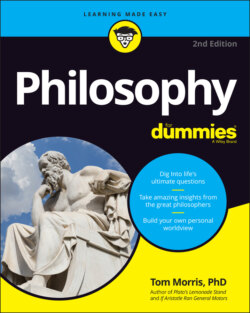Читать книгу Philosophy For Dummies - Tom Morris - Страница 42
The complete definition of knowledge
ОглавлениеOne necessary condition for knowledge is belief. (See the earlier section “Understanding Belief.”) A second is truth (as it is explained in the immediately preceding section). Knowledge is built on true belief. But these two conditions are not alone sufficient for knowledge. I can believe something, and my belief can be true without my actually knowing the thing believed. More is needed.
Suppose that you were somehow to conjure up for yourself right now the belief that, at this very moment, the world’s richest man is brushing his teeth. Imagine you actually make yourself believe this, by sheer force of will, or you are hypnotized into believing it. And suppose further that, by extraordinary coincidence alone, the richest man in the world happens at this very moment to be polishing those shiny molars, nearly ready to rinse and spit. You have the belief. And the belief happens to be true. But you have no evidence of its truth. No proper connections have conveyed the truth to you. Imagine you just got lucky and happened to hold the belief at a rare moment when something was going on that made it true. Philosophers will deny that you had real knowledge of the fact stated. You did not know that the man in question was brushing. A wildly lucky coincidence of correspondence is not the appropriate attainment. Seneca (the practical Roman Stoic philosopher) pointed out a parallel situation by declaring that, “luck never made a man wise.” Luck can’t confer knowledge either. An amazing coincidence is not a connection sufficient to create something as solid as knowledge is meant to be.
Philosophers insist that, in order for a state of belief to qualify as knowledge, there must be a real link, a proper connection, a tie of some sort like a causal chain, between your mental state of affirmation and the state of reality which makes that affirmation true. Furthermore, this link must be of the right sort to properly justify my having that belief. If I see my cat Mollie on the bed and that visual perception has caused me in normal ways to form the belief that “Mollie is on the bed,” then most philosophers will grant that my belief counts as knowledge. I don’t just believe she is on the bed; I know it.
